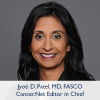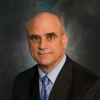How to Discuss Your Goals of Care With Your Cancer Care Team: An Expert Discussion
In this “Meaningful Conversations” podcast, Dr. Lalan Wilfong and social worker Lydia Mills discuss what people with cancer should know about discussing their goals of care with the health care team, including tips for navigating this conversation.









